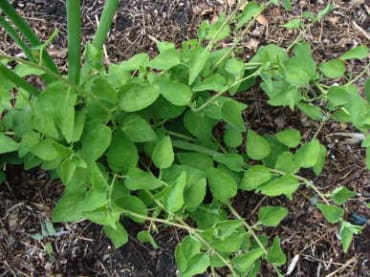Open-pollinated. Also called Poor Man’s Ginseng and dang shen in China. Perennial to Zone 4. Used in Chinese medicine like ginseng, but considerably easier to grow than true Panax ginseng. Also fun to grow as a novel ornamental. Tendrilly twining vines with small ovate leaves grow to 3–4' long by their second year. Mature vine about 5–6' long. Buds look like green peas, swell to little green balloons, flower as green bells with purple veining, then mature to five-sided-balloon seed pods. Harvest long firm sweet roots with tight skins in autumn at 4–6 years. Used to support energy levels, digestion, immune response, and to clear excess mucus from the lungs. Full sun to part shade, well-drained soil. ~3,700 seeds/g. ①
Codonopsis Herb
Codonopsis Herb
Open-pollinated. Also called Poor Man’s Ginseng and dang shen in China. Perennial to Zone 4. Used in Chinese medicine like ginseng, but considerably easier to grow than true Panax ginseng. Also fun to grow as a novel ornamental. Tendrilly twining vines with small ovate leaves grow to 3–4' long by their second year. Mature vine about 5–6' long. Buds look like green peas, swell to little green balloons, flower as green bells with purple veining, then mature to five-sided-balloon seed pods. Harvest long firm sweet roots with tight skins in autumn at 4–6 years. Used to support energy levels, digestion, immune response, and to clear excess mucus from the lungs. Full sun to part shade, well-drained soil. ~3,700 seeds/g. ①
Additional Information
Herbs
See Herb Chart for uses and cultural information.
About medicinal herbs: Archeological evidence dates the medicinal use of herbs back 60,000 years to the Neanderthals. 85% of the world’s population employ herbs as medicines, and 40% of pharmaceuticals in the U.S. contain plant-derived materials. Fewer than 10% of higher plant species have been investigated for their medicinal components. Interest in traditional herbal remedies continues to grow.
Statements about medicinal use of plants have not been evaluated by the FDA, and should not be used for the diagnosis, treatment, cure or prevention of any ailment. Before using or ingesting any medicinal plant, consult a healthcare practitioner familiar with botanical medicine.
Takinagawa Burdock and Resina Calendula, as well as oats, mammoth red clover and alfalfa in the Farm Seed section, also have medicinal uses. Medicinal herbs such as black cohosh, licorice, and many more are available as plants, and shipped in the spring with orders from our Trees division.
Culture: Some herbs are customarily grown from divisions because they cannot come true from seed, such as scented thymes and flavored mints. Some require fall sowing of fresh seed, such as sweet cicely and angelica.
Using herbs: Drying herbs at home is not difficult. Whole leaves retain their flavor at least a year. To substitute fresh herbs for dried in cooking, use triple the dried quantity called for in a recipe.
Germination Testing
For the latest results of our germination tests, please see the germination page.
Our Seeds are Non-GMO

All of our seeds are non-GMO, and free of neonicotinoids and fungicides. Fedco is one of the original companies to sign the Safe Seed Pledge.


